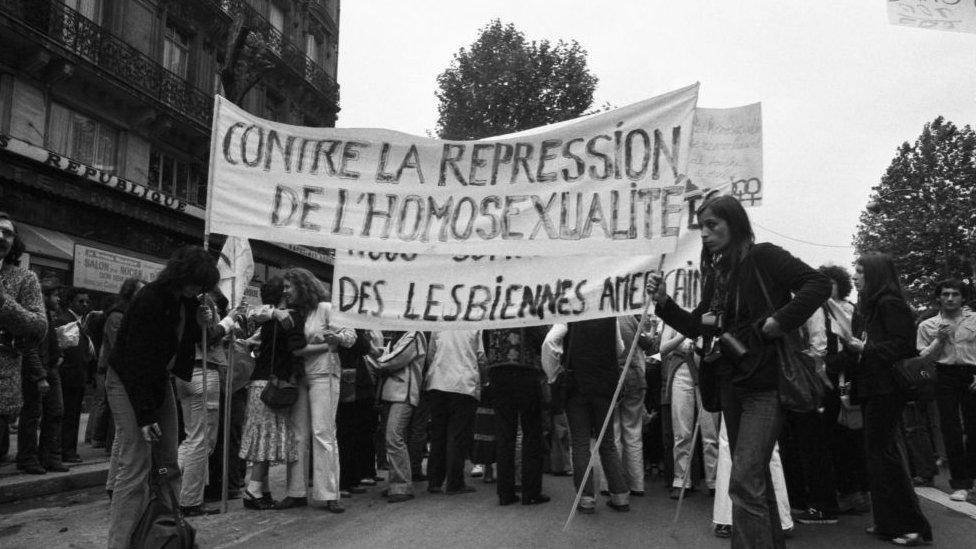French Senate to debate anti-gay law apology
- Published

A 1977 protest against anti-gay repression in France
"It was catastrophic for me. It was shameful."
Bernard Bousset recounts the events which changed his life in a clear voice, but he is visibly still deeply troubled, all these years later.
In 1964, a man he had spent the night with stole his watch and some money. After reporting the theft, the police charged Mr Bousset with sexual activity with a minor, under a discriminatory law inherited from the Nazi collaborator authorities of Vichy France which imposed different ages of consent for homosexual and heterosexual sex.
Mr Bousset, today 81, was eventually issued a "significant" fine. But what was more disastrous was the press's reporting of the conviction - which made it public knowledge to everyone around him. The consequences were calamitous, he recalls. "At the time, homosexuality was so negatively perceived. I was ostracised from my family. I was so ashamed."
"You could lose your job and your home for being gay. You had no rights."
Mr Bousset is one of an estimated 10,000 people - mostly gay men - who were convicted between 1942 and 1982 under laws used to target homosexuals.
On Wednesday, the French Senate - the upper house of the French parliament - will debate a bill which would offer a formal apology to the victims of the homophobic legislation.
If passed, the bill would financially compensate victims of two discriminatory laws. One was the Vichy-era legislation, which set the age of consent for homosexual sex at 21, compared to 13 for opposite-sex relationships. After the Nazi occupation ended in 1945, the new authorities did not repeal the law.
A second law, adopted in 1960, criminalised homosexuality as a "social scourge," alongside alcoholism, drug use and prostitution. Judges were given wide leeway to target homosexuals under existing laws criminalising public indecency, says Antoine Idier, an associate professor at Sciences Po Saint-Germain-en-Laye, a political sciences university.
Victims of the discriminatory legislation frequently had their lives ruined, says Mr Idier. People could be fined or jailed for several months. On release, many faced social ostracism. Some lost their jobs or were forced to move cities. "In a few cases, we even see cases of suicide," he adds.
People convicted under the laws included Charles Trenet, the singer of classic ballads La Mer and Douce France, who spent 28 days in prison after being accused of soliciting young men in 1963. Though the charges were eventually dropped, the high-profile case publicly highlighted Mr Trenet's homosexuality, about which he was discreet.

The singer Charles Trenet spent 28 days in jail after being accused of soliciting young men in 1963
Hussein Bourgi, a Socialist lawmaker who proposed the bill, said: "It is high time to bring justice to the living victims of legislation which served as the basis for a politics of repression with brutal and punishing social, professional and familial consequences."
If the proposed law passes, it would bring France into line with other European countries, which in recent years have officially apologised to the victims of homophobic legislation.
The UK's "Turing Law," which received royal assent in 2017, pardoned gay men convicted under some discriminatory legislation. In the same year, Germany apologised to the victims of anti-gay laws adopted under the Nazis and maintained by the authorities of post-war West Germany.
"France is later than other countries on this issue," says Régis Schlagdenhauffen, an assistant professor at the School for Advanced Studies in the Social Sciences (EHESS) who has researched the persecution of gay people in France. "But it should officially recognise the injustice while some victims are still alive."
"France will be greater for it," he adds.
The bill is not certain to pass. In its initial stages, it received a mixed reception from senators, who were sceptical of proposals to pay living victims €10,000 (£8,730). Even if passed by the Senate, it would also need to be approved by the National Assembly before becoming law.
Mr Idier says the bill as it stands does not go far enough. He argues the law should also recognise people who were convicted under pre-1942 laws, which did not explicitly target homosexuals but gave judges discretion to enforce them against gay people.
As for Mr Bousset, though welcoming of the bill, he says the attempt to reckon with France's past has come too late.
"It will not erase [the pain] I lived with and which many homosexuals still live with," he says. "It is incredible to say, but even today, I am still ashamed when I am in straight environments."
"I never could erase this conviction. It lives within me."
- Published26 January 2022

- Published29 June 2021
